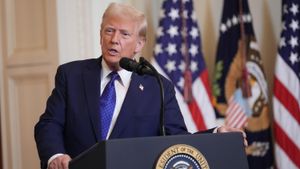Texas Governor Greg Abbott has announced the deployment of 400 soldiers along the U.S.-Mexico border, marking a significant enhancement of the state's security measures amid the Trump administration's renewed focus on immigration enforcement. According to Abbott, the Texas Tactical Border Force is set to mobilize to the Rio Grande Valley to collaborate directly with federal authorities.
"Texas has a partner in the White House we can work with to secure the Texas-Mexico border," Abbott stated. This declaration reflects the administration's shifting priorities under President Trump, who has made immigration central to his campaign and policy agenda. Trump intends to sign 10 executive orders shortly after taking office, which will significantly overhaul the immigration enforcement process, directing the military to take a more active role at the border.
The executive actions will include the declaration of a national emergency at the border to combat record levels of unauthorized crossings, as well as measures aimed at enhancing military involvement including deploying National Guard units. An anonymous White House official emphasized the urgent nature of the crisis, saying, "Our southern border is overrun," highlighting the administration's narrative of immigration as an invasion.
Much of the new enforcement strategy delegates significant powers to the U.S. military, which historically has not engaged directly with domestic immigration issues. Instead, military resources will be redirected to support border enforcement and the construction of barriers along the southern border. This development signifies a radical change, as past military operations have focused on external threats rather than internal enforcement.
Accompanying this military engagement will be intensified actions from U.S. Immigration and Customs Enforcement (ICE). Since January, ICE has ramped up its enforcement operations, following directives from the Trump administration to prioritize undocumented immigrants, described by officials as criminals. With reports indicating more than 5,500 arrests so far this month, ICE's focus includes individuals arrested on unrelated criminal charges. Karoline Leavitt, White House press secretary, announced, "Deportation flights have begun," signaling the administration's commitment to swift actions against those unlawfully present.
The ramifications of such policies are being felt at the community level. Reports of increased ICE activities have sown anxiety and fear among immigrant populations, particularly in cities like Worcester, Massachusetts. Local immigrants' rights advocates have observed heightened trepidation, with many undocumented individuals still seeking assistance from local services hesitating to step outside their homes.
“People are very nervous," said Worcester Mayor Joseph M. Petty, noting community concerns about potential ICE raids. Residents are reportedly afraid to engage in daily activities, including going to work or school. This rising fear is justified by the local experiences of arrests carried out by ICE, which recently detained individuals viewed as dangers, alongside the increased visibility of enforcement actions.
Community leaders, such as Maricelis Gonzalez of El Buen Samaritano Food Program Inc., are working tirelessly to ease tensions within the immigrant community. She sees the need for education among residents about their rights and what to do if approached by federal agents. Gonzalez stated, "It's heartbreaking. It’s all happening so fast," illustrating the confusion and disruption felt within the community as new enforcement actions take shape.
Worcester's city administration is currently gathering information and formulating policies to respond to local immigration enforcement scenarios. Council members are concerned about potential legal repercussions from the federal government for failing to cooperate fully with ICE operations. They seek clarity on how local law enforcement should interact with federal agencies amid changing directives and rising accountability issues.
City Manager Eric Batista acknowledged the challenges, affirming, “Worcester would never target individuals based on immigration status or identity.” This statement conveys the competing objectives of maintaining community integrity and compliance with federal immigration policy, which can often be at odds with local municipal laws prioritizing residents' safety and trust.
This tension extends to places where individuals traditionally considered sensitive zones against immigration raids, such as schools and churches. Legal experts question the Trump administration’s authority to redefine the parameters of enforcement within these sensitive locations. With the stakes potentially involving significant litigation and community pushback, the fallout from these immigration policies could shape the Bush administration’s agenda moving forward.
Overall, the increasing militarization of immigration enforcement under the Trump administration evokes significant concern among immigrant rights advocates, community leaders, and local lawmakers. The next steps from both the administration and community responses will be closely monitored as the situation continues to evolve. Harsh enforcement measures are counterbalanced by the urgent need to preserve the rights and dignity of individuals seeking safety and asylum.



